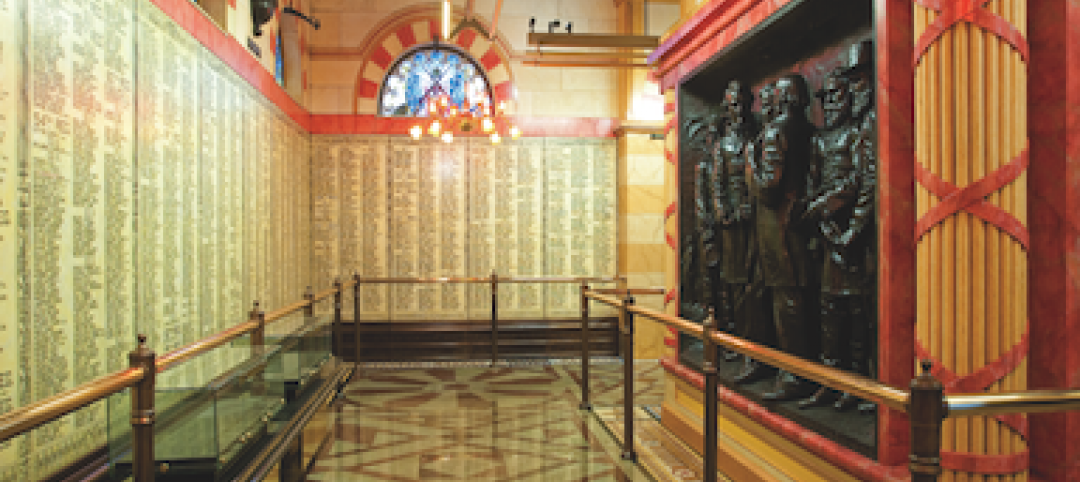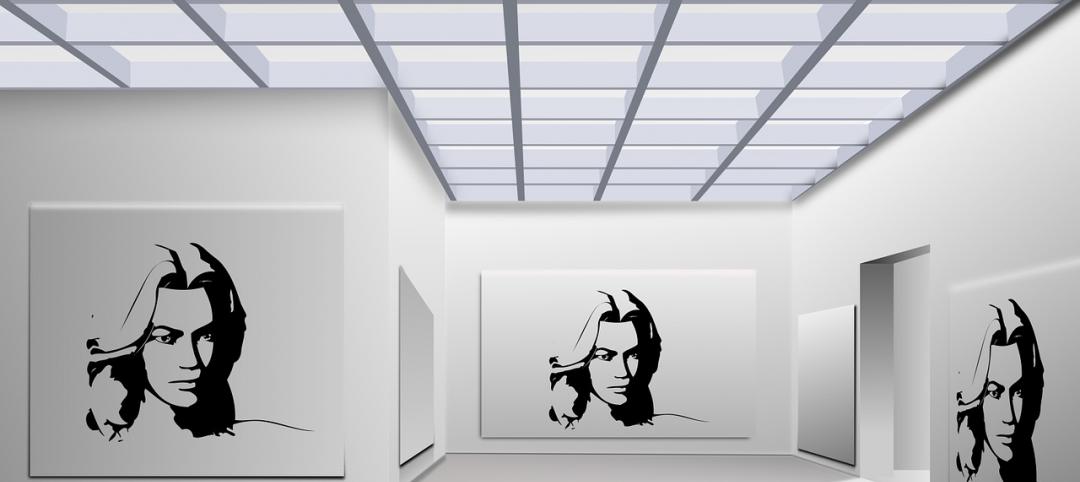The Philadelphia Art Commission has weighed in somewhat unfavorably on Robert A.M. Stern's design for the Museum of the American Revolution in Philadelphia.
According to The Inquirer, the commission didn't offically reject the $150 million proposal, but on Feb 5 it did communicate concerns about the building's design. Specifically, the commission asked Stern to eliminate a cupola, add eye-level windows on the ground floor, and rethink the building's composition.
The museum, supported by H.F. "Gerry" Lenfest, the Oneida Indian Nation, and the state of Pennsylvania, will exist in a space currently dominated by a red brick visitor center built for Philadelphia's Bicentennial in 1976. The commission has approved the demolition of the visitor center so that museum construction can start in the summer of 2014.
"This building really has a big-box-store mentality with a little bit of ornament attached," David B. Brownlee, a Penn art historian and vice chair of the Design Advocacy Group, told Inga Saffron of The Inquirer. Read the full report from The Inquirer.
Here is the firm's essay on the current design scheme for the museum (via www.ramsa.com):
The Museum of the American Revolution, anchoring the eastern end of Independence National Historical Park, is designed to introduce visitors to the American Revolution with its extraordinary collection of historical artifacts and contemporary interpretations demonstrating the continued worldwide importance of the Revolution.
Set amidst buildings of national and architectural significance—facing the First Bank of the United States (Samuel Blodgett, 1795), near William Strickland's Merchant's Exchange (1834) and the U.S. Custom House (Ritter & Shay, 1934)—the Museum will carry forward the restrained Classicism that heralded the birth of the Republic.
The Museum will address the corner of Chestnut and Third Streets with a broad plaza and an inviting entry facade that offers a glimpse at the treasures within through a two-story glazed portico. The museum shop and a café that opens to the sidewalk will enliven the Third Street facade; above, the wall that conceals the galleries will be articulated with brick quoining and recessed blind brick arches, accented with stone at the spring points and keystones and housing stone apsidal niches.
Our design organizes the Museum around a skylit central interior court. The ground floor will accommodate a multi-use theater and a changing exhibition gallery. Within the court a grand elliptical stair will take visitors up to 18,000 square feet of galleries and a theater dedicated to the exhibition of George Washington's marquee tent, one of the Museum's most dramatic holdings.
The Museum's third floor will offer rooms for conferences, symposia, and social events; two broad terraces overlooking the First Bank will command views to Independence Hall and the modern-day Philadelphia skyline.
The Museum will provide state-of-the-art storage and conservation spaces, following best practices for sustainable museum design to target LEED Silver certification.
The Museum will announce itself with a distinctive tower set directly above the lobby: atop a rectangular lantern with scalloped corners, sized to house a full-scale replica of the Liberty bell, will rise a cylindrical cupola with a bell-shaped roof that celebrates in a contemporary way the importance of our nation's founding.
Related Stories
| Oct 12, 2010
Cuyahoga County Soldiers’ and Sailors’ Monument, Cleveland, Ohio
27th Annual Reconstruction Awards—Gold Award. The Cuyahoga County Soldiers’ and Sailors’ Monument was dedicated on the Fourth of July, 1894, to honor the memory of the more than 9,000 Cuyahoga County veterans of the Civil War.
| Aug 11, 2010
JE Dunn, Balfour Beatty among country's biggest institutional building contractors, according to BD+C's Giants 300 report
A ranking of the Top 50 Institutional Contractors based on Building Design+Construction's 2009 Giants 300 survey. For more Giants 300 rankings, visit http://www.BDCnetwork.com/Giants
| Aug 11, 2010
Jacobs, Arup, AECOM top BD+C's ranking of the nation's 75 largest international design firms
A ranking of the Top 75 International Design Firms based on Building Design+Construction's 2009 Giants 300 survey. For more Giants 300 rankings, visit http://www.BDCnetwork.com/Giants
| Aug 11, 2010
Walter P Moore wins top award for Nerman Museum of Contemporary Art
With structural engineering from Walter P Moore, Nerman Museum of Contemporary Art has won the New Buildings Under $30 Million project category in the 2009 Structural Engineers Association of Kansas & Missouri (SEAKM) Awards Program.
| Aug 11, 2010
Thom Mayne unveils 'floating cube' design for the Perot Museum of Nature and Science in Dallas
Calling it a “living educational tool featuring architecture inspired by nature and science,” Pritzker Prize Laureate Thom Mayne and leaders from the Museum of Nature & Science unveiled the schematic designs and building model for the Perot Museum of Nature & Science at Victory Park. Groundbreaking on the approximately $185 million project will be held later this fall, and the Museum is expected to open by early 2013.
| Aug 11, 2010
Rafael Vinoly-designed East Wing opens at Cleveland Museum of Art
Rafael Vinoly Architects has designed the new East Wing at the Cleveland Museum of Art (CMA), Ohio, which opened to the public on June 27, 2009. Its completion marks the opening of the first of three planned wings.
| Aug 11, 2010
Girl Scouts of San Jacinto Council Program Place Project
Houston, Texas
The Girl Scouts of San Jacinto Council Program Place is the headquarters for the largest Girl Scout Council in the U.S., with 63,000 scouts. The building houses the council’s administrative offices, a Girl Scout museum, and activity space. When an adjacent two-story office building became available, the council jumped at the chance to expand its museum and program space.
| Aug 11, 2010
Jacobs, HDR top BD+C's ranking of the nation's 100 largest institutional building design firms
A ranking of the Top 100 Institutional Design Firms based on Building Design+Construction's 2009 Giants 300 survey. For more Giants 300 rankings, visit http://www.BDCnetwork.com/Giants
Museums | Aug 11, 2010
Design guidelines for museums, archives, and art storage facilities
This column diagnoses the three most common moisture challenges with museums, archives, and art storage facilities and provides design guidance on how to avoid them.








